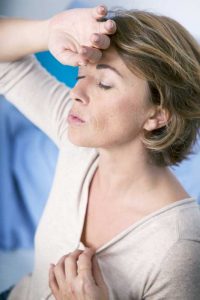Menopause affects every system in a woman’s body. Recent analysis suggests that sleep is one area where older women are likely to suffer.
Women are disproportionately prone to sleep disorders, a mystery that has been explored by researchers but never fully solved. There are many proposed causes of this lack of quality sleep, from female hormones to the stress of modern life. New research in chronobiology has found that women in menopause are especially likely to suffer from insomnia, with over one-third of these people reporting insomnia.
The Effects of Insomnia
Insomnia is more than a nighttime disorder; the effects of sleepless nights can leave people exhausted, more likely to be in deadly accidents and even give them a higher risk of developing chronic disease. A lack of quality sleep can affect almost every aspect of one’s life and health. However, why are women—and perimenopausal women in particular—so disproportionately prone to sleepless nights?
The Circadian Rhythm of Menopause
The side effects of menopause follow a circadian rhythm. Women are more likely to get hot flashes, or feelings of discomfort and even unbearable warmth, in the evening. This is the time when core body temperature is highest, so the timing of this symptom makes sense on an intuitive level.
In addition, women in menopause will find that many of their symptoms follow a circadian rhythm. This is likely due to the effects of the circadian rhythm on estrogen production. As with many hormones, estrogen production follows a 24-hour cycle in addition to a monthly one. Because many of the side effects of menopause are linked to the decrease in female reproductive hormones, these symptoms may vary from a predictable daily schedule.
Hormonal Changes and Sleep

In addition, progesterone, one female hormone that appears to have a place in aiding sleep, falls to low levels during and after menopause. Research has found that women don’t sleep as well during times in their monthly cycles when progesterone is low, such as during menstruation. Because progesterone levels become permanently and constantly depressed in menopause, a lack of progesterone may be a powerful causative factor in menopausal insomnia.
Because all women will experience menopause, it is important for health care practitioners to understand this natural process. New information can lead to new treatments that make the change of life more comfortable and enjoyable for women going through menopause. In addition, there is a potential for chronotherapy if and when causative links are firmly identified. In the meantime, researchers recommend that women suffering from insomnia follow the standard recommendations for this disorder, including low levels of light in the evening and melatonin supplementation when needed.







